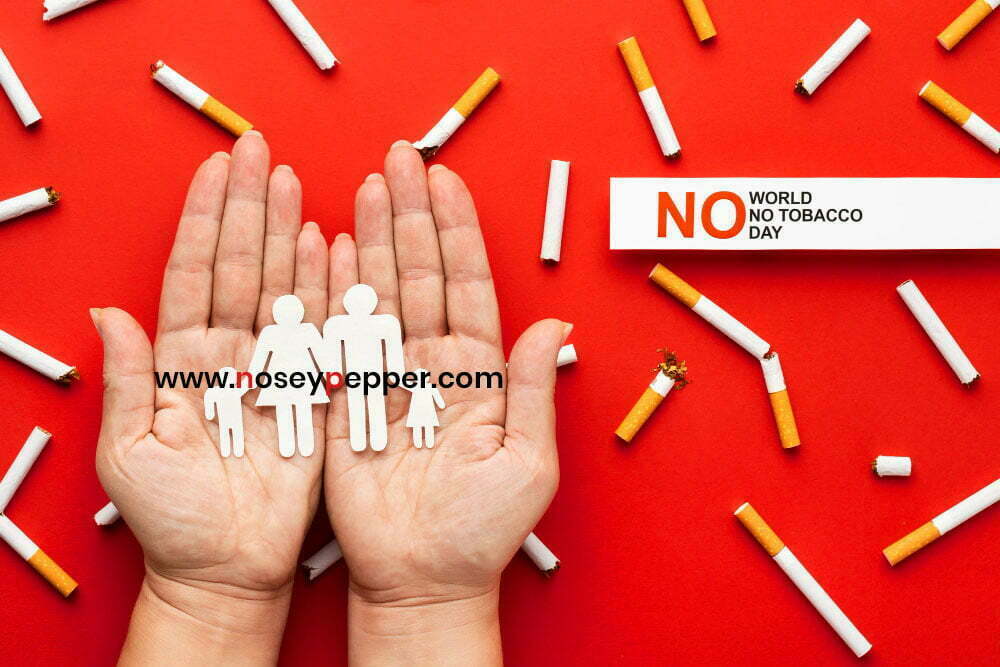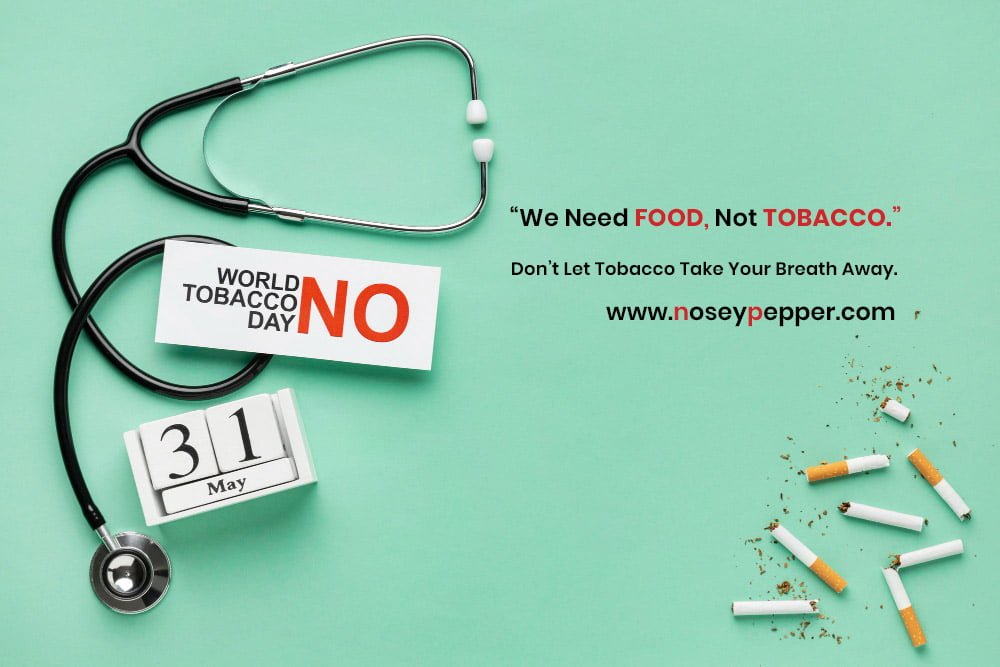World No Tobacco Day (WNTD) will be observed on May 31, 2023, by the WHO in collaboration with public health advocates from all around the world. “We Need Food, Not Tobacco” is the theme for this year. Smoking is an extremely difficult habit to break because tobacco contains an addictive chemical nicotine.
Most people are aware that smoking:
causes of heart disease, lung disease, and cancer can reduce life expectancy by 10 years or more.
can set a smoker back a few thousand dollars each year.
Why then do people continue to light up? Addiction is the answer, to put it simply.
Once You Start, It’s Difficult to Stop
As with heroin or other addictive drugs, the body and mind quickly get used to cigarettes’ nicotine. Soon, a person needs it to feel normal.
People start smoking for different reasons. Some think it looks cool. Others started because they saw their friend’s smoke. Almost all adult tobacco users begin smoking before 18 years old. Most never expected to become addicted. That’s why it’s so much easier not to smoke.
What About Smoking E-Cigarettes and Hookahs?
People get hooked on more than cigarettes.
Also beware of vaping. Battery-operated e-cigarettes use cartridges filled with nicotine, flavorings, and other harmful chemicals and turn them into vapor that’s inhaled by the user.
Some people think e-cigarettes are safer than regular cigarettes because they don’t contain tobacco. But the other ingredients are dangerous too. In fact, e-cigarette users have reported serious lung damage and even death. So health experts strongly warn against using them.
Water pipes called hookahs are used to smoke tobacco through hoses that have mouthpieces. Some people think they’re safer than cigarettes because smoke cools when it passes through the water. However, see the black sludge that collects in a hookah pipe. Some of it makes its way into users’ mouths and lungs. Additionally, because they lack filters and are routinely used for lengthy periods of time, their health risks may be considerably higher. Since hookahs are frequently shared, there is an increased chance that germs will spread along with the pipe.
How Can Smoking Affect Your Health?
Many of the compounds found in cigarettes, such as nicotine and cyanide, are toxins that can be fatal in high concentrations. The body is intelligent. When poisoned, it responds by defending itself. The first few times a person tries tobacco, they frequently experience discomfort or burning in their throat and lungs, and some even experience nausea.
Smoking over time results in health issues like:
- Heart condition
- Stroke
- lung injury
- various malignancies, including throat, lung, stomach, and bladder cancer
- Other problems include:
- Gum disease
- Yellow teeth
- Eye disease
- An increased risk of infections (like pneumonia)
- An increased risk of diabetes
- Weaker bones that are easier to break
- Skin problems like psoriasis (a type of rash)
- Wrinkled skin
- Ulcers

Smoking affects sexual health in both men and women. It increases the chance of significant health issues including heart attacks in girls who use hormone-based birth control methods like the Pill, the patch, or the ring. Additionally, smoking can make it more difficult for women to become pregnant.
Besides these long-term problems, cigarettes and other products also affect the body quickly. Teen smokers can have many of these problems.
Bad breath. Cigarettes leave smokers with halitosis, or chronic foul breath.
Bad-smelling clothes and hair. Stale smoke smells last — not just on people’s clothing, but also hair, furniture, and cars. It’s very difficult to get smoke smell out.
Trouble keeping up with sports. Smokers usually struggle with non-smokers. Sports performance is harmed by smoking’s physiological consequences, such as a rapid heartbeat, poor circulation, and shortness of breath.
A higher risk of injury and a slower healing time. Smoking hurts the body’s collagen production. Thus, typical sports injuries like tendons and ligament damage heal more slowly in smokers than in non-smokers.
Increased illness risk. Studies show that smokers get sick more with colds, flu, bronchitis, and pneumonia than non-smokers. And people with some health conditions, like asthma, get sicker if they smoke (and often if they’re just around smokers). Teenagers who smoke to control their weight frequently light up rather than eat. So their bodies lack nutrients needed to grow, develop, and fight illness.
Kicking Butts and Staying Smoke-Free
Smokeless tobacco, cigars, hookahs, pipes, and all other types of tobacco are harmful to your health. It doesn’t help to substitute products advertised as better for you, such as e-cigarettes or filtered cigarettes.
Avoiding these items is the only thing that actually helps. Especially if everyone around you smokes or vapes, this isn’t always simple. It may help to have your reasons for saying no ready for times you feel the pressure. Try “I just don’t like it” or “I want to stay in shape for soccer” (or football, basketball, or another sport).
If you smoke or vape and want to give up, you have lots of information and support available. Different approaches to quitting work for different people. For some, quitting cold turkey is the best. Others believe a more deliberate pace is preferable. Some people find that it helps to refer to a support group especially for teens.
You may find information and support online at:
Also Read: Cardio equipment to exercise at home -improve your cardiovascular health
When quitting, know that the first few days are the most challenging. So don’t give up. Some people have a few relapses before quitting for good.
You’ll have more energy, a better appearance, more money in your wallet, and ultimately more life if you don’t smoke.
Discover more from NoseyPepper
Subscribe to get the latest posts sent to your email.










Pingback : World Blood Donor Day: A Call to Action for Blood Donation
Pingback : Strong And Healthy Tummy: Tips To Nurture Your Digestive Health
Pingback : World Chocolate Day: Celebrating the Sweetest Day of the Year